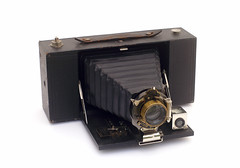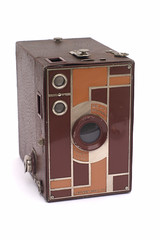Eric Borel (talk | contribs) (→Links) |
Danipuntocom (talk | contribs) m (→Links) |
||
| Line 40: | Line 40: | ||
==Links== |
==Links== |
||
| + | * [http://sites.google.com/site/fromthefocalplanetoinfinity/patents Kodak patents], a collection of over 1,200 Kodak patents, including some Brownie cameras. |
||
* [http://en.wikipedia.org/wiki/Palmer_Cox Palmer Cox] at [http://en.wikipedia.org/wiki/Main_Page Wikipedia] |
* [http://en.wikipedia.org/wiki/Palmer_Cox Palmer Cox] at [http://en.wikipedia.org/wiki/Main_Page Wikipedia] |
||
* [http://www.brownie-camera.com/ The Brownie Camera Page] by [http://www.brownie-camera.com/formmail.shtml Chuck Baker] |
* [http://www.brownie-camera.com/ The Brownie Camera Page] by [http://www.brownie-camera.com/formmail.shtml Chuck Baker] |
||
Revision as of 20:52, 12 April 2014
Brownies

|
| 1909 No 3A Folding Brownie Model A |

|
| 1930 Beau Brownie No 2A by Capt Kodak |

|
| 1946 Brownie Flash Six-20 by Terri Monahan |
The name "Brownie" was a trademark used by Kodak for an enormous variety of cameras, over an 80-year history. The common theme of all the cameras bearing the brand is that they were intended as affordable snapshot-takers, with few or no exposure or focus adjustments provided.
The original box Brownie camera was introduced in 1900, for a new 117 film format yielding 6 exposures 2-1/4" square. One of the final appearances of the Brownie name occurred with a 110-cartridge camera sold by Kodak Ltd. in 1980.[1]
In the intervening years, Brownie cameras were sold which used 117, 120, 116, 124, 122, 125, 130, 127, 620, and 110 film sizes.[2] One historically significant introduction was the No.2 Brownie of 1901. This model introduced 120 film,[1] which later proved to be the longest-surviving of all roll film sizes.
At the time of the first 1900 model, the name "Brownie" would have been familiar to the North American public as a series of elf-like cartoon characters, introduced in 1883 by Canadian writer and illustrator Palmer Cox, which drew on the brownies of Scottish folk tradition[3]. Kodak advertised early Brownie cameras with its own drawings of elf-like creatures, but these do not seem to have been drawn by or licensed from Palmer Cox.[4]
The Brownie name is also considered to be a tribute to Kodak's camera designer Frank Brownell, whose designs contributed much to Kodak's early success. His Brownie design (a simple cardboard box-camera priced at just USD $1.00) was affordable even for children, thus carrying Kodak's goal of affordable mass-market photography even further.
Considering its long history, one can't rule out the possibility of the Brownie name reappearing again some day, presumably on a simple Kodak digital camera.
Notes
- ↑ 1.0 1.1 McKeown, James M. and Joan C. McKeown's Price Guide to Antique and Classic Cameras, 12th Edition, 2005-2006. USA, Centennial Photo Service, 2004. ISBN 0-931838-40-1 (hardcover). ISBN 0-931838-41-X (softcover).
- ↑ Brownie Model list at The Brownie Camera Page.
- ↑ Palmer Cox (1840–1924), Creator of The Brownies at Townships Heritage Webmagazine, Quebec, Canada
- ↑ Brownie Camera Links from Palmer Cox history posted at the Freemason's Grand Lodge of BC and Yukon, Canada.
Links
- Kodak patents, a collection of over 1,200 Kodak patents, including some Brownie cameras.
- Palmer Cox at Wikipedia
- The Brownie Camera Page by Chuck Baker
- The Remigijus box Brownie Camera Page by Remy Steller]
- A picture gallery using Kodak Brownie Box Camera
- Kodak's and Brownies on www.collection-appareils.fr by Sylvain Halgand